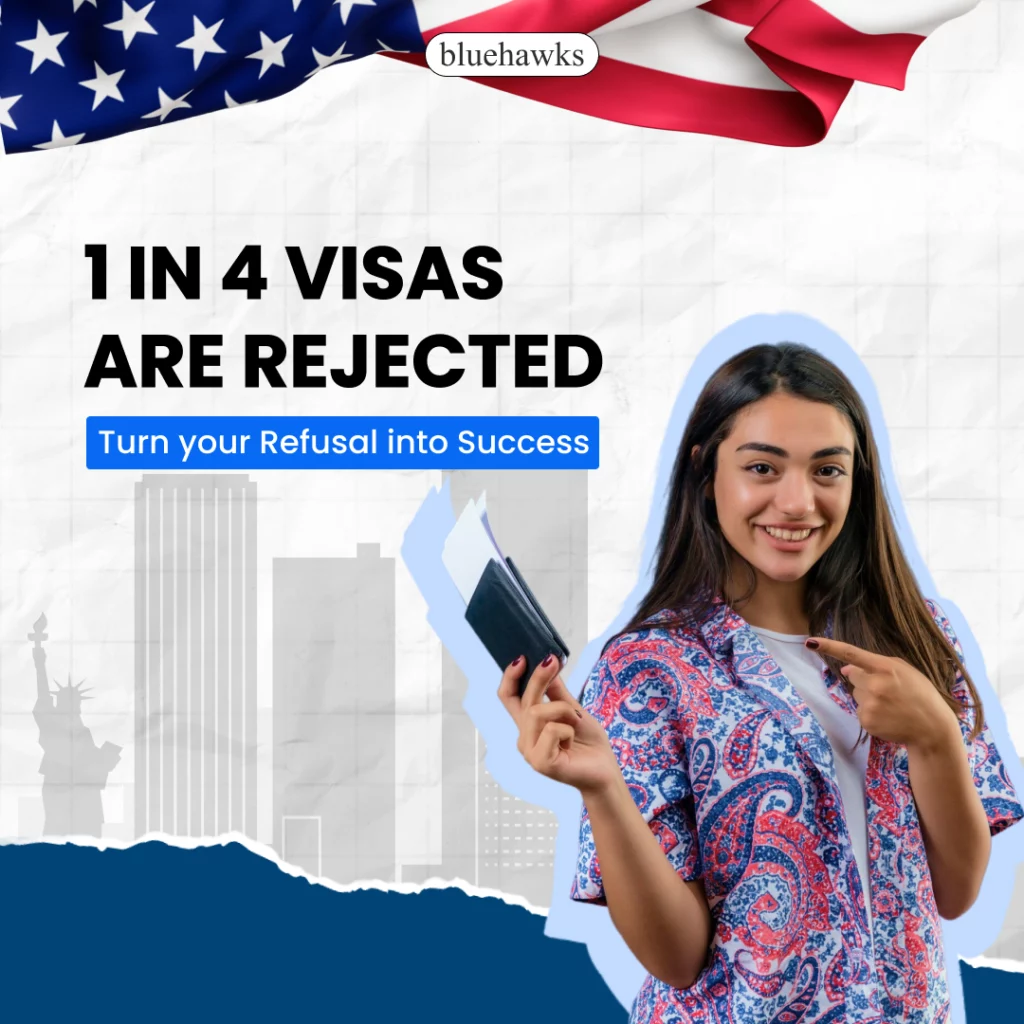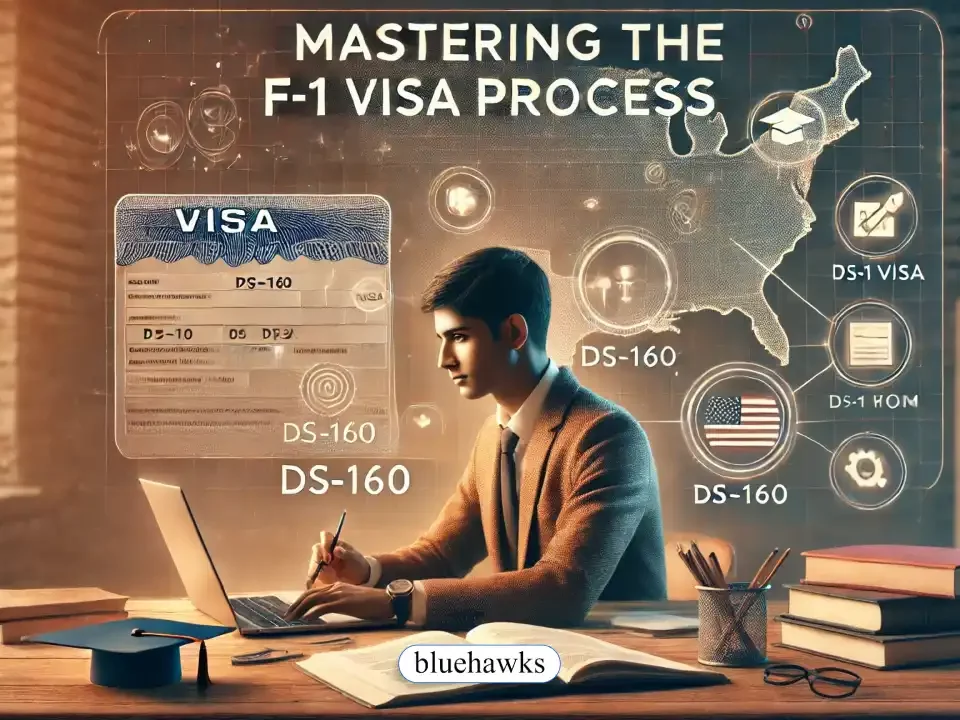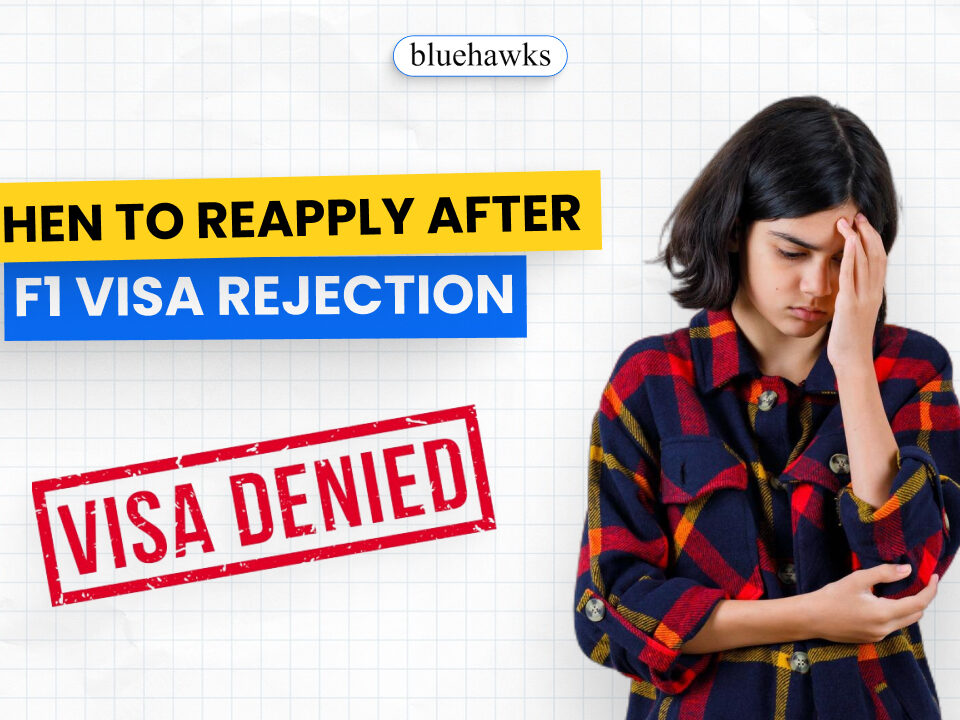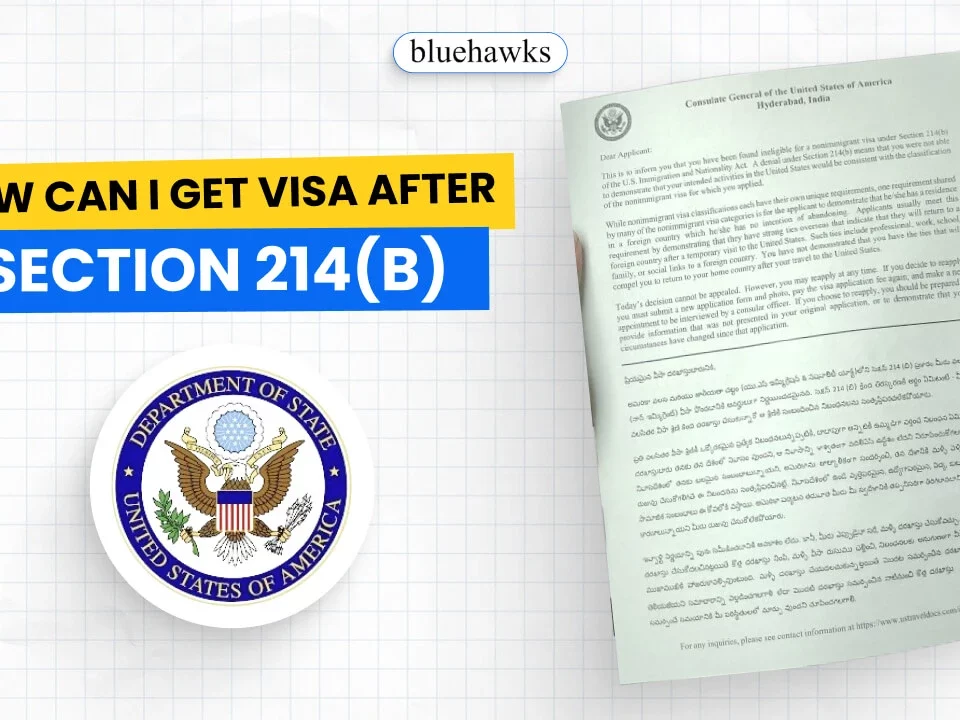What to do if your F1 Visa is rejected?
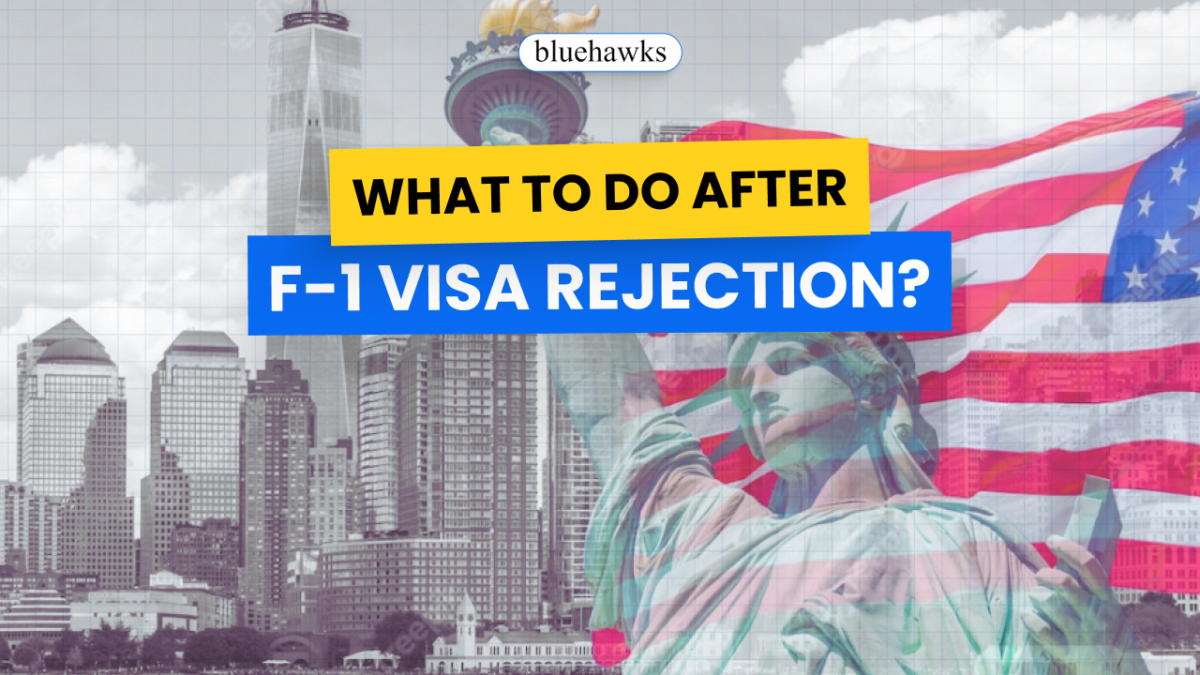
F1 Visa Rejection: Reasons, FAQs & Interview tips
Were you denied a student visa and wondering what to do next after your F1 Visa rejection? Feeling disappointed is normal; however, don’t be discouraged. Our visa experts have advice on how to get an F1 Visa after rejection.
Table of contents
- F1 Visa Rejection: Reasons, FAQs & Interview tips
- What Is a Student Visa?
- How do you know why your F1 Visa was rejected ?
- Reasons why F1 Visa your F1 Visa is rejected?
- My Options if my F1 Visa is rejected?
- Steps to Follow After Your F1 Visa is Rejected
- When can we reapply?
- Does F1 Visa Rejection affect my future applications?
- What is the approval rate for an F1 Visa?
- Does a university’s ranking matter for getting a visa?
- How bluehawks Can Help If Your F1 Visa is rejected
Imagine this: you’ve spent months filling out detailed applications, gathering documents, and preparing for your visa interview. Then, you find out your student visa to study in the US has been denied. It’s okay to feel upset; however, don’t lose hope because there are ways to bounce back and try again.
Before we share his tips on how to get your F1 Visa after a rejection, let’s first cover some basics about getting a student visa for the USA.
What Is a Student Visa?
Ever thought about studying in the US? Well, you’d need something called a student visa for that. The US government offers three types: F-1, J-1, and M-1, depending on what kind of school or program you’re going to.
First things first, you have to apply and get accepted into a US university or program that’s approved by the Student and Exchange Visitor Program (SEVP). Once you’re in, you can apply for your student visa. Your school will give you either an I-20 form (for F-1 and M-1 visas) or a DS-2019 form (for J-1 visas). These forms tell you everything important about your program, like when it starts and ends, how much it costs, and if there’s any financial help available.
Getting your student visa isn’t simple. It involves a lot of paperwork and details. Make sure you have everything you need before you start. After filling out the DS-160 form, contact your nearest US embassy or consulate right away to set up your interview. It can take a while to get an appointment, and any delay might mean you can’t start your program on time.
F-1 Student Visa
The F-1 visa is the most common choice for international students pursuing academic degrees at US universities. It also covers language programs and high schools offering academic programs.
J-1 Visa
If you’re participating in an exchange program sponsored by the Department of State Bureau of Educational and Cultural Affairs, you’ll need a J-1 visa. This visa is for students funded by designated State Department sponsors.
M-1 Visa
The M-1 visa is for students pursuing non-academic or vocational studies in the US, such as technical programs, cooking school, or automotive repair. It requires enrollment in a SEVP-certified institute.
How do you know why your F1 Visa was rejected ?
When it comes to understanding visa denials, the U.S. consular authorities are generally prompt in notifying applicants of the specific visa denial code. Applicants receive a paper notice that cites the applicable section of U.S. law, such as Section 214(b), under which their visa application was denied. For a comprehensive list of potential denial reasons, one can refer to the U.S. Department of State’s official website. Despite this, the exact reasons behind a visa denial may remain elusive.
Some of the significant visa denial reasons include:
Denial under section 214(b) of the Immigration and Nationality Act
The notice for a 214(b) denial tends to be broad, lacking specificity to your individual case. This lack of detailed explanation can lead to confusion and frustration among applicants, leaving them uncertain about how to address the issues for future applications. You can check out the list of reasons on the U.S. Department of State’s official web page.
Denial under Section 212(a) of the Immigration and Nationality Act
“Visa applications might get denied if the consular officer has concerns about your eligibility, often termed as ‘inadmissible.’ If there’s something in your past or a comment made during the interview that raises eyebrows, it could trigger a denial. This includes health concerns, any past criminal history, or previous immigration issues that might work against you. It’s these little details that can sway the decision, so it’s crucial to be upfront and clear about your background.”
Refusal under Section 212(g) of the Immigration and Nationality Act
Sometimes, a consular officer might hit the pause button on your visa application, using Section 221(g). This just means they need a bit more info from you, or they’re taking an extra moment to look things over. Your application isn’t denied; it’s just on hold. You’ll need to provide any additional documents they ask for to get things moving again. But don’t stress – not all 221(g) notices are red flags. It could be as simple as the officer needing to verify something small, like your SEVIS status if you’re heading over as an F1 student. Think of 221(g) as a timeout for ‘administrative processing,’ giving the officer some breathing room to ensure everything’s in order before they make their final call.
Reasons why F1 Visa your F1 Visa is rejected?
When you apply for a student visa to study in the USA, you’ll need to show and prove a few important things during your F-1 visa interview. These include how you will pay for your education, your ties to your home country, your plans to return home, your specific degree program, and why you chose your university.
There are several reasons why a visa might be denied. Your visa denial letter will explain the reason, although it might not give a lot of details. While Homeland Security doesn’t provide exact numbers, it’s estimated that about 34.93% of F-1 visa applications were rejected in 2022, although this rate can vary a lot depending on the country.
1. Unsuccessful Visa Interview
When you apply for an F1 visa, you must attend an interview at the embassy or consulate. This interview usually lasts only 2-3 minutes, but it’s very important. You need to clearly explain why you chose the USA and the specific university or college. If you can’t do this well, your visa might be rejected. It’s important to be honest and confident.
2. Late Visa Application
If you apply for your visa after the start date of your program, as shown on your I-20 or DS-2019 form, your application can be denied. It’s always better to apply early to avoid this problem.
3. Insufficient Evidence of Intent to Return
You need to show that you plan to return to your home country after finishing your studies. If the consulate officer doubts that you will return, they might reject your visa.
4. Country of Origin
Sometimes, applicants from economically developed and politically stable countries have an easier time getting visas compared to those from less developed countries.
5. Weak Ties to Home Country
You need to show strong connections to your home country, like family, a job, or financial stability. If the consulate officer thinks your ties are weak, they might deny your visa.
6. Failure to Comply with F1 Visa Rules
If you have previously broken F1 visa rules, like not maintaining full-time enrollment or working without authorization, your visa can be rejected. Admitting to illegal activities can also lead to rejection.
7. Technical Issues
Mistakes in your application or problems with the SEVIS system can cause delays or rejections. Applying after your program start date can also lead to rejection.
8. Applicant Profile
If the consulate officer thinks you lack clear academic or career goals, especially if you’re in your 20s, they might see you as a risk. Poor English skills, inability to explain your plans, or negative body language can hurt your chances.
9. Financial Documentation
You must prove you have enough money to cover your education and living expenses. If the consulate officer doubts your financial stability, they might reject your visa.
10. Previous U.S. Presence and Violations
If you’ve previously stayed in the U.S. without proper authorization or have a poor academic record, your visa might be denied. Additionally, previous visa rejections or status changes (like switching from a tourist visa to a student visa) can also be problematic.
11. Inadmissibility and Criminal History
Any arrests or criminal history can lead to visa rejection. Even temporary refusals can have long-term consequences if they cause you to miss a semester.
12. Other Factors
- Geopolitical Tensions: Political issues between the U.S. and your home country can increase refusal rates.
- Misrepresentation: Any discrepancies or false information in your application can lead to rejection.
- Health, Criminal, Security Violations: These can make you inadmissible.
- Romantic Relationships: If you have a U.S.-based sponsor, the consulate officer might question your true intentions.
- Social Media Presence: If your social media shows you as a “party animal” or “spoiled rich kid,” it can negatively impact your application.
- Travel Experience: Limited travel experience can be seen as a sign of financial instability.
- Job Changes: Frequent job changes or unemployment might make you look like you lack direction.
- Program Alignment: You need to clearly explain how your chosen program fits your goals.
- Disinterest: Appearing disinterested or lacking ambition can hurt your chances.
- Family in the U.S.: Not reporting relatives in the U.S. can be considered misrepresentation.
- Relatives Seeking Asylum: This can raise concerns about your intentions.
- Previous Visa Overstays: Even unintentional overstays can lead to refusal.
- Political Tensions: Broader political tensions can lead to higher refusal rates.
- Behavior Changes: Changing visa types or applying separately from dependents can be seen as attempts to circumvent the system.
13. Lack of Finances
You must show that you have the financial means to pay for your education and living expenses in the U.S. for the entire duration of your program. This includes tuition, insurance, dining, living expenses, books, and miscellaneous costs. If you can’t prove this, your visa can be denied.
14. Inadequate English Proficiency
Besides the English test scores you submitted to your college or university, you will need to demonstrate your English proficiency during your interview with the consular officer. You can prepare by practicing with a native English speaker. Some example questions you might be asked include:
- Have you been to the US before?
- Do you have family, relatives, or friends in the US?
- What will you be studying?
- Why did you choose that college/university?
My Options if my F1 Visa is rejected?
Although this isn’t the best scenario, getting denied an F1 visa is not a reason to lose hope. You still have some options available:
1. Reapply
If you’re determined to study in the U.S., you can reapply for the F1 visa. Since there’s no formal appeal process, the best course of action is to reapply for the F1 student visa. This involves submitting a new application, paying the visa fees again, and attending another interview. Reapplying allows you to present a stronger application and demonstrate your eligibility for the F1 visa. By addressing previous issues and preparing thoroughly, you can increase your chances of a successful visa application.
2. Education in Other Countries
If studying abroad is your final decision, there are plenty of world-class universities in other countries that offer the same quality of education, sometimes at a lower cost. For example:
- Australia, Canada, and Europe have many high-ranked universities along with U.S. universities in the world rankings.
- The visa process in these countries is often less strenuous. With great facilities and opportunities, these countries can be ideal choices.
- You can still come to the U.S. later after completing a course in another country.
3. Applying for a Job
Your final aim might be to secure a good job, so why not start now? There are ample employment opportunities available according to your qualifications. All you need is a good resume.
- Education can still be an option, and work experience will only add more points to your profile.
- Many people opt to go for higher studies after gaining some work experience, like an Executive MBA.
- Work experience also provides real-world training and gives the consulate a reason to believe that you would return to your job after completing your studies.
4. Pursuing Courses While Applying Again Next Year
If you have to wait another year to reapply, use that time to undertake some courses of interest.
- Most universities in the U.S. have prerequisites before you can start a course. These prerequisites can take a substantial amount of time, so catching up on these courses is a good idea.
- Some courses might be available online. They will improve your knowledge and may help you finish your course faster and get a good job after graduation.
5. Studying in Your Home Country
Many good colleges offer quality education and ample job opportunities in your homeland.
- Prepare for and attempt the necessary tests to secure admissions to these colleges.
- It is always beneficial to study in your country, as education can help you better the situations in your home country.
- This tactic can open up other opportunities later in life.
Remember, an F1 visa denial is just a setback, not the end of your dreams. There are many paths to success!
Steps to Follow After Your F1 Visa is Rejected
If your F1 visa gets rejected, don’t worry! Here are some simple steps to help you understand what to do next and how to reapply.
Understand the Reasons Behind the Visa Denial
When your visa gets denied, you’ll receive a rejection letter that explains why. Make sure to read it carefully and understand the reasons given.
Find a Solution to the Problem
Once you know why your visa was denied, you can work on fixing the problem. Here are some common issues and how to address them:
- Not Enough Savings or Funds: Make sure you have enough money to cover your stay. You might need to show more savings or find a reliable sponsor.
- Intent to Return Home: Be clear about your plans to return home after your studies. You might need to explain this better in your next interview.
If the issue is legal, consider getting help from a lawyer or an official in charge.
Reapply
After addressing the reason for your denial, you can reapply for your F1 visa. Follow these steps:
- Complete a New Visa Application Form (DS-160): Fill out the form again and make sure all information is accurate.
- Pay the Visa Application Fee: You’ll need to pay the fee again.
- Schedule a New Visa Interview Appointment: Go to the website of the U.S. Consulate or Embassy to schedule your appointment.
Prepare for the Visa Interview
Before your interview, make sure you:
- Gather Additional Supporting Documents: Bring any new documents that strengthen your case.
- Prepare Thoroughly: Think about the questions you might be asked and practice your answers.
- Have All Required Documents: Make sure you have everything you need for the interview.
Attend the Interview
On the day of your interview:
- Arrive on Time: Being punctual shows that you are serious.
- Explain Your Intentions and Qualifications Clearly: Be honest and clear about why you want to study in the U.S. and your plans for the future.
If the denial reasons are related to your admission form, ask for help from the Designated School Officials at your school. If the reasons are different, seek assistance from immigration officials.
Remember, reapplying for an F1 visa after a rejection is a chance to show that you’ve addressed the issues and are ready for a successful application.
Keep Reading: F1 Visa Interview Questions & Answers Complete Guide
When can we reapply?
You can reapply for an F1 visa just three business days after your initial rejection. There’s no rule saying you have to wait longer. However, it’s usually not a good idea to reapply right away, since your situation is unlikely to change much in just three days.
How many times can you reapply?
If your F1 visa is rejected, don’t worry—you can reapply as many times as needed until you receive approval. There’s no limit to the number of attempts you can make, giving you unlimited opportunities to succeed.
Each time you reapply, focus on improving your application by addressing previous issues and gathering new supporting documents. Stay persistent and positive throughout the process, knowing that perseverance can lead to achieving your goal of obtaining an F1 visa for studying in the U.S.
Can You Appeal a Visa Rejection?
If your F1 visa application is rejected, unfortunately, there is no formal appeal process available. The decision made by the consular officer is final, and you cannot appeal through the embassy or consulate where you applied. However, you do have the option to reapply.
Does F1 Visa Rejection affect my future applications?
If your F1 visa application was rejected and you’re considering applying again, you might wonder about your chances. Instead of applying for a new F1 visa, you can simply get a new I-20 to extend your current visa.
The truth is, a visa rejection stays on your record and can affect future interviews. However, it doesn’t mean you won’t get a visa in the future. Each application is reviewed independently, and officers aim to be fair.
- Reconsidering Previous Rejections: When a visa officer decides to approve your visa despite a past rejection, they are reconsidering the earlier decision. While they look at each case with fresh eyes, past rejections may still influence their decision.
- Understanding and Improving: It’s important to figure out what went wrong in your last interview and show how you’ve made improvements. Understanding these issues and demonstrating positive changes can greatly increase your chances.
- Expert Help from bluehawks: At bluehawks, our experienced team knows all about visa interviews. They can identify likely reasons for your previous rejection and help you prepare for a successful interview.
Ideally, you want to avoid visa rejections altogether. While this isn’t always possible, preparing with bluehawks can boost your confidence and readiness for your visa interview. We’ve helped many applicants with past rejections successfully obtain their visas.
What is the approval rate for an F1 Visa?
In 2023, Indian students received the highest number of F-1 visas for studying in the USA, totaling 130,839. This marks a 14% increase from the previous year and highlights India’s strong presence in American universities.
Key Facts about the F1 Visa:
- Acceptance Rate: The acceptance rate for F1 visas in 2023 was 63.74%, reflecting the likelihood of approval for Indian applicants.
- Early Entry: Holders can enter the USA up to 30 days before their program starts, allowing time to settle in.
- Early Issuance: New students can obtain their visa up to 365 days before their course begins, easing travel planning.
- Age Exceptions: Applicants below 13 or above 80 years old can receive the F1 visa without an interview.
- Accompanying Dependents: Spouses and minor children can join under the F2 visa, accompanying the student during their studies.
- Departure Requirements: Students must leave the USA within 60 days of completing their program to maintain legal status.
- Visa Extension: Extensions are possible through the USCIS website, offering flexibility for continued academic pursuits.
Trends in Approval Rates:
| Year | Approval Rate (%) |
| 2019 | 79% |
| 2020 | 68% |
| 2022 | 65% |
| 2023 | 63.74% |
The approval rate has fluctuated over recent years, influenced by factors like the applicant’s country, academic background, and financial stability. In 2019, the approval rate was 79%, declining to 65% by 2022 due to increased scrutiny.
Does a university’s ranking matter for getting a visa?
When preparing for your F1 visa interview, it’s crucial to understand that there’s no guaranteed formula for securing acceptance based solely on the university you choose. Much like a job interview, your university’s reputation can make a positive impression, but it’s just one piece of the puzzle.
While a prestigious university can bolster your application, your reasons for selecting that specific school hold more weight than its ranking. Demonstrating a clear and genuine purpose for choosing a particular educational institution can significantly improve your chances of visa approval.
Which consulate is best for getting F1 Visa approvals?
Choosing the right US consulate in India can be crucial for your visa interview success. While Delhi appears to have the highest visa approvals, the best consulate for you is actually the closest one. According to our research and embassy advice, proximity matters more than slight approval rate differences between consulates. Focus on showing confidence, strong ties to India, and having your finances in order. Avoid mentioning plans to work in the USA.
Know more on F1 Visa Refusal Slots
Visa Interview Tips
Visa interview questions can vary depending on your country and study program, so it’s hard to predict exactly what you’ll be asked. However, there are common topics that visa officers usually cover, as explained in our visa interview prep guide. These include:
- Study Plans
- University Choice
- Academic Capability
- Financial Status
- Post-Graduation Plans
First, do your research and prepare your answers. We recommend practicing with a friend or family member. Make sure all the information in your application matches what you say during the interview.
Here are some questions you might be asked:
- Why was your previous visa application rejected?
- What changes have you made to your application since the last time?
- Why do you still want to study in the US after being rejected?
- How are you planning to finance your education?
- Do you have any new test scores or academic achievements?
- Have you addressed the issues that led to your previous rejection?
Don’t memorize your answers. Instead, rehearse to cover the main points while sounding genuine. Practicing can also help calm your nerves. Always show up on time, dress professionally, have your required documents ready, and answer all questions clearly and briefly.
Conclusion
In conclusion, U.S. visa denials and administrative processing are not always clear-cut. Even if the officer gives you a 214(b) letter, you may never know the exact reason for the refusal. If you need help preparing for your upcoming interview, our Expert F1 Visa coach will help you through what to expect and answer all your questions.
How bluehawks Can Help If Your F1 Visa is rejected
You can overcome your visa refusal with the help of bluehawks. More than 1 in 3 international students will face a visa denial at their F1 interview. bluehawks offers a range of services to help you succeed in your next attempt:
- Mock Interviews: Practice your interview skills with our experts to boost your confidence.
- Live Q&A Sessions: Get real-time answers to your questions and concerns.
- Detailed Feedback: Receive insights to highlight your strengths and address weaknesses in your applicant profile.
- Strategic Approaches and Responses: Learn effective strategies and responses for common interview questions.
- In-Depth Review of Your Visa Application (DS-160): Ensure your application is complete and accurate.
With bluehawks, you get the support you need to enhance your strengths, address any weaknesses, and increase your chances of getting your F1 visa.

